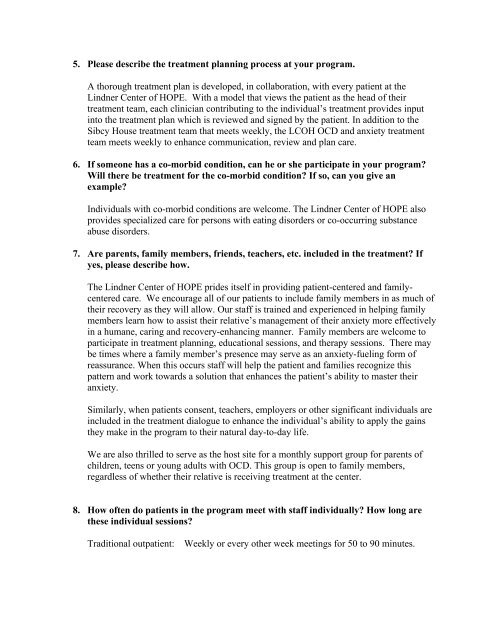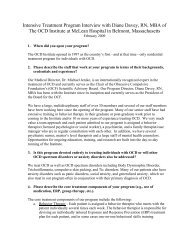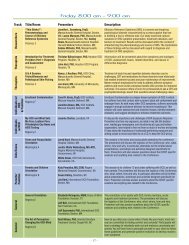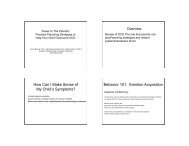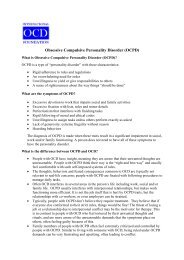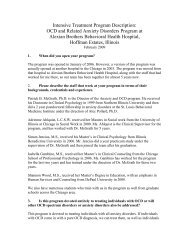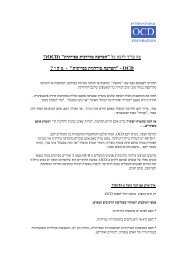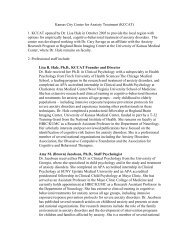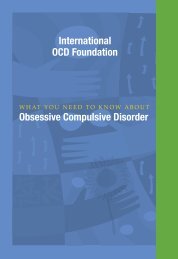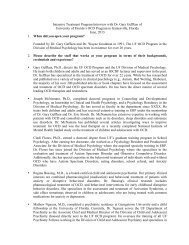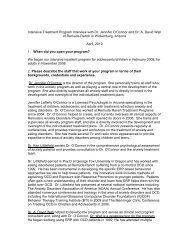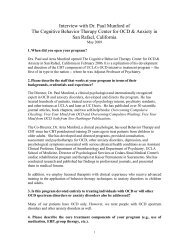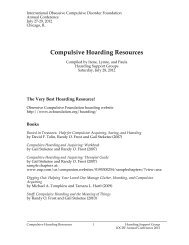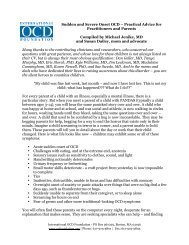The Lindner Center - Obsessive Compulsive Foundation
The Lindner Center - Obsessive Compulsive Foundation
The Lindner Center - Obsessive Compulsive Foundation
You also want an ePaper? Increase the reach of your titles
YUMPU automatically turns print PDFs into web optimized ePapers that Google loves.
5. Please describe the treatment planning process at your program.<br />
A thorough treatment plan is developed, in collaboration, with every patient at the<br />
<strong>Lindner</strong> <strong>Center</strong> of HOPE. With a model that views the patient as the head of their<br />
treatment team, each clinician contributing to the individual’s treatment provides input<br />
into the treatment plan which is reviewed and signed by the patient. In addition to the<br />
Sibcy House treatment team that meets weekly, the LCOH OCD and anxiety treatment<br />
team meets weekly to enhance communication, review and plan care.<br />
6. If someone has a co-morbid condition, can he or she participate in your program<br />
Will there be treatment for the co-morbid condition If so, can you give an<br />
example<br />
Individuals with co-morbid conditions are welcome. <strong>The</strong> <strong>Lindner</strong> <strong>Center</strong> of HOPE also<br />
provides specialized care for persons with eating disorders or co-occurring substance<br />
abuse disorders.<br />
7. Are parents, family members, friends, teachers, etc. included in the treatment If<br />
yes, please describe how.<br />
<strong>The</strong> <strong>Lindner</strong> <strong>Center</strong> of HOPE prides itself in providing patient-centered and familycentered<br />
care. We encourage all of our patients to include family members in as much of<br />
their recovery as they will allow. Our staff is trained and experienced in helping family<br />
members learn how to assist their relative’s management of their anxiety more effectively<br />
in a humane, caring and recovery-enhancing manner. Family members are welcome to<br />
participate in treatment planning, educational sessions, and therapy sessions. <strong>The</strong>re may<br />
be times where a family member’s presence may serve as an anxiety-fueling form of<br />
reassurance. When this occurs staff will help the patient and families recognize this<br />
pattern and work towards a solution that enhances the patient’s ability to master their<br />
anxiety.<br />
Similarly, when patients consent, teachers, employers or other significant individuals are<br />
included in the treatment dialogue to enhance the individual’s ability to apply the gains<br />
they make in the program to their natural day-to-day life.<br />
We are also thrilled to serve as the host site for a monthly support group for parents of<br />
children, teens or young adults with OCD. This group is open to family members,<br />
regardless of whether their relative is receiving treatment at the center.<br />
8. How often do patients in the program meet with staff individually How long are<br />
these individual sessions<br />
Traditional outpatient:<br />
Weekly or every other week meetings for 50 to 90 minutes.


